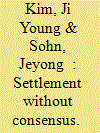|
|
|
Sort Order |
|
|
|
Items / Page
|
|
|
|
|
|
|
| Srl | Item |
| 1 |
ID:
149642


|
|
|
|
|
| Summary/Abstract |
During the World War II, up to 200,000 women, the majority of whom were Korean, were forced to provide sex to Japan’s military forces. The perceived refusal of Japan to fully take responsibility for the mistreatment of these “comfort women” has been a major obstacle to Japanese-Korean relations for a quarter of a century. Although the signing of the December 28, 2015 Agreement between Japan and Korea purported to “finally and irreversibly” solve the comfort women issue that has divided these two East Asian powers, the voices of Korean and Korean-American civil society indicate the contrary. American local, county, and state governments have become key battlegrounds in the conflict. As comfort women memorials across the USA proliferate, these governmental entities have allowed themselves to be caught up in incomplete narratives, whether Japanese or Korean. Against the backdrop of the tense geopolitics of today’s Asia-Pacific, a more responsible, comprehensive inquiry is needed to bring closure to a tragic chapter of human history.
|
|
|
|
|
|
|
|
|
|
|
|
|
|
|
|
| 2 |
ID:
152075


|
|
|
|
|
| Summary/Abstract |
What has shaped contemporary discourse on Japan’s comfort women issue? During the last twenty-five years, civic groups in both Japan and South Korea have made significant efforts to publicize the issue within the international community, hoping to narrow the disparity between the position of the international community and that of the Japanese government. Thus far, however, Japan’s official position has shown little change. Why has international pressure on Japan failed? By focusing on the relationship between international pressure and the formation of Japan’s discourse on the comfort women issue, this paper shows how outside pressure led to a domestic backlash among conservatives in Japan, resulting in the failure to institutionalize apologetic discourse within Japanese society. This study will provide important insights on how democratic countries can sometimes resist strong external pressure to conform to international norms.
|
|
|
|
|
|
|
|
|
|
|
|
|
|
|
|
|
|
|
|
|